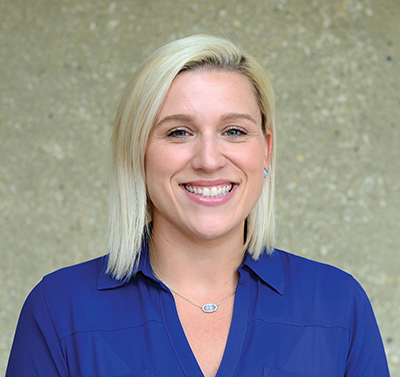From the Dietitian’s Desk

Proper nutrition is part of your treatment plan
Bethany Wendland, MS, RD, CSO, LD
Clinical Dietitian Specialist | Board Certified Specialist in Oncology | The University of Kansas Cancer Center
Nutrition will be a valuable part of your treatment and recovery, and it will be very important to have a partner by your side early on. Ideally, you will meet with a dietitian on day one to help you understand the challenges ahead. If your cancer center does not have a dietitian on staff, ask for a referral. The dietitian can provide many resources and help you overcome any barriers you have.
Because of the nature of head and neck cancer treatment, your relationship with food will change, specifically what you eat and how you eat. “Healthy diet” takes on a new meaning. Typically, we recommend avoiding things such as heavy creams and butter. Not anymore. Because weight loss will naturally occur with your treatment, keeping weight on, however you can, will become a goal.
Your body needs extra nutrients during treatment, and being well-nourished helps make your recovery faster and easier. Your physician may encourage you to eat a high calorie, high protein diet before treatment begins and continue for as long as you are able to eat normally once treatment is underway.
Your dietitian can recommend the best foods to include in your diet. You may have used high protein/low calorie drinks to stay fit, but now you will need high protein/high calorie drinks.
For many people, there comes a time when they must rely on enteral nutrition (tube feeding) because they can’t get all the nutrition they need by mouth. People are often fearful about tube feeding, so your dietitian will introduce the concept early on to help you get into the right mindset. Think of nutrition as a type of treatment, and tube feeding as a tool to help you be successful.
Your dietitian will show you how to administer a feeding and how to care for the tube. Many people go home with their feeding tube and can easily manage it alone or with the help of a caregiver.
Keep in mind that the more weight you lose, the longer it will take to recover. Too much weight loss could turn a 3 to 6 month recovery time into one that takes 9 to 12 months.
Your dietitian will see you regularly, whether as a hospital inpatient or when you come in for treatments, and will be by your side every step of the way.


